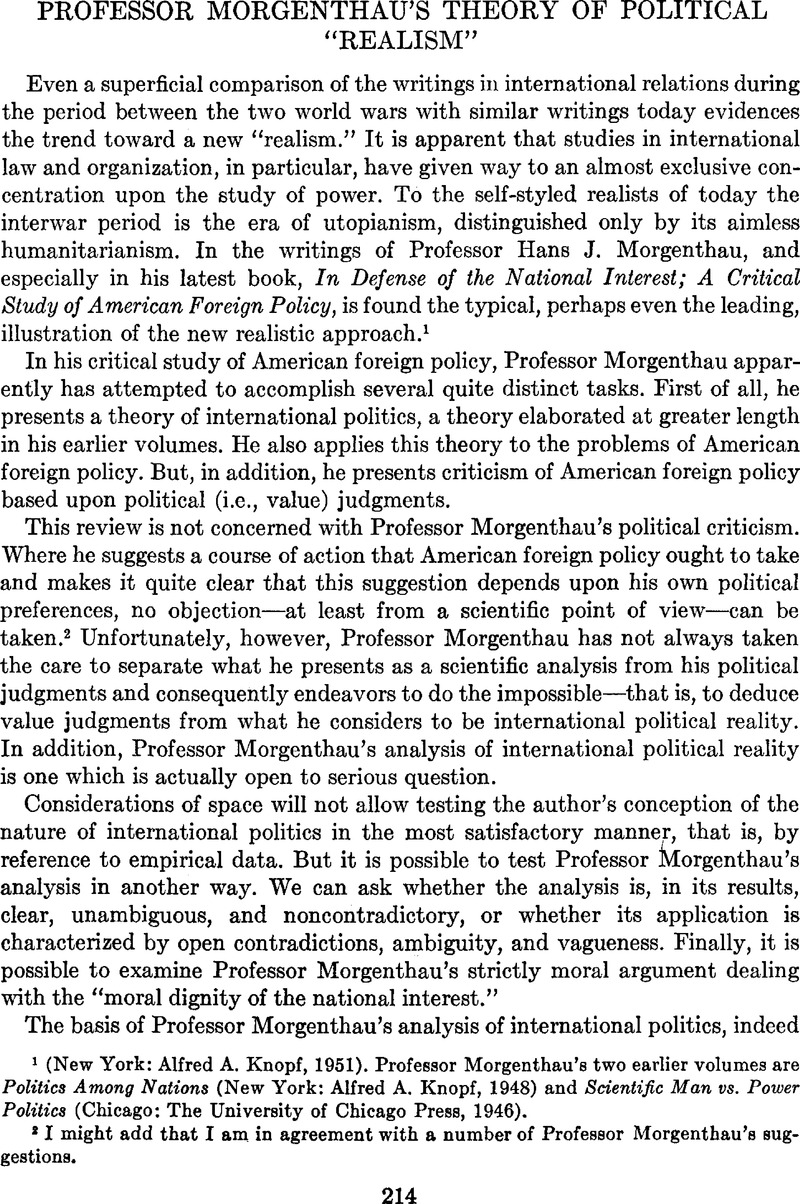Published online by Cambridge University Press: 02 September 2013

1 (New York: Alfred A. Knopf, 1951). Professor Morgenthau's two earlier volumes are Politics Among Nations (New York: Alfred A. Knopf, 1948)Google Scholar and Scientific Man vs. Power Politics (Chicago: The University of Chicago Press, 1946)Google Scholar.
2 I might add that I am in agreement with a number of Professor Morgenthau's suggestions.
3 See ProfessorMorgenthau's, article, “The Escape from Power in the Modern World,” in MacIver, R. M. et al. (eds.), Conflicts of Power in Modern Culture (New York: Harper and Brothers, 1947)Google Scholar.
4 This statement is not free from ambiguity. If power is limited and qualified, it is not supreme. Precisely the same statement could be made concerning national politics, and we would be just as uncertain as to the importance of power.
5 In Defense of the National Interest, p. 13.
6 Ibid.
7 For an illustration of this attitude, see Scientific Man vs. Power Politics, pp. 71–74.
8 It is evident that a psychological theory leading to these results would lose any value it might have as an instrument for the explanation of human conduct. For the statement that all human action is determined by egotism would explain nothing: it is incapable of describing in a meaningful way any differences in human behavior. Professor Morgenthau's analogous thesis that the conduct of states is always determined by the desire for power is at times quite as meaningless.
9 See Politics Among Nations, p. 62.
10 Ibid., p. 22, n. 2.
11 For some examples, see In Defense of the National Interest, pp. 135, 144, 147, and 154.
12 Just what the meaning of “light and darkness” is, I do not quite know.
13 It would be a different matter if Professor Morgenthau, without denying that the present tension is “real” at both levels, merely maintained that a solution is possible only at the power level. This may or may not be true, but at least it is quite understandable. However, such an admission might require a reformulation of some “laws,” an act Professor Morgenthau is apparently unwilling to perform since a reformulation would undercut his supposedly scientific analysis.
14 Professor Morgenthau's position on this question is outlined in Ch. 3, pp. 69–90. For the statement concerning Russia's “perennial interests,” see p. 97.
15 On more than one occasion it has happened that the need of a status quo policy (in terms of power) is to violate treaty engagements while the need of an expansionist policy is to preserve these engagements. State A, let us say, concludes a treaty with State B. Forming the political basis of the treaty is a certain distribution of power. In time, however, the factual (power) situation existing at the conclusion of the treaty changes, without the latter's violation, in favor of State A. State B, desiring to follow a status quo policy (in terms of power, not law), then needs to violate the treaty. State A, following an expansionist policy, is perfectly willing to let the treaty stand.
16 “A foreign policy derived from the national interest is in fact morally superior to a foreign policy inspired by universal moral principles” (pp. 38–39).
17 It must be insisted that Professor Morgenthau cannot logically limit national interest to self-preservation. His argument applies, whatever the national interests may be. However, see below, pp. 223–24.
18 This would appear to be the meaning of Professor Morgenthau's remark when, paraphrasing Hobbes, he states that “the state creates morality as well as law and … there is neither morality nor law outside the state” (p. 34). However, there is some difficulty in Professor Morgenthau's position on this point since he apparently does not wish to identify morality with law, as did Hobbes.
19 I emphasize the word possible. It is true that Professor Morgenthau's entire argument can logically lead to different consequences, but the point is that it can lead to these.
Comments
No Comments have been published for this article.